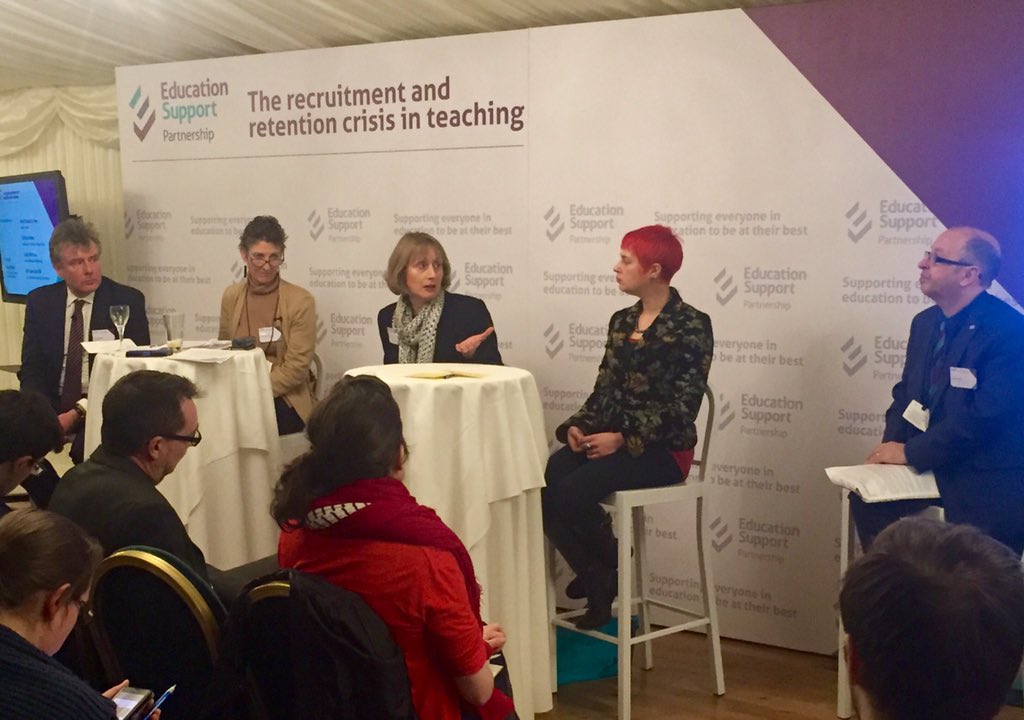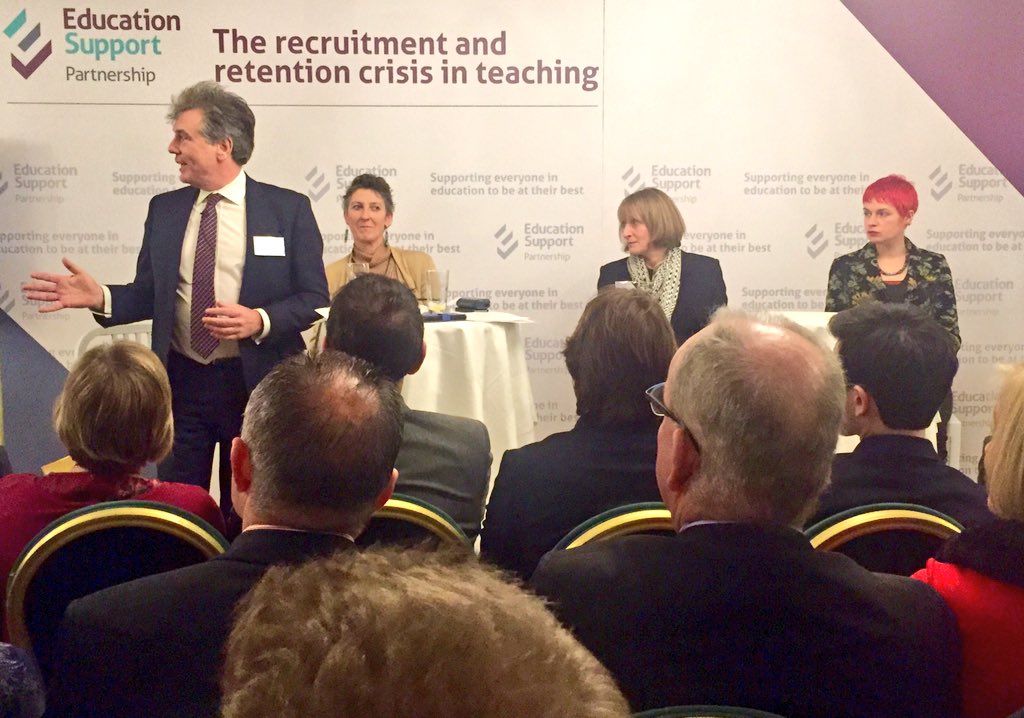| Though it was a great honour to be invited to speak, I was especially concerned because one thing I had been consistently clear on was that I didn’t pretend to have answers. I was happy to share my perspective on the symptoms but could not presume to begin suggesting a remedy. Of course, I had to revise this approach to contribute to the discussion and I began to wonder if my apparent humility was in fact a somewhat lazy way to avoid conflict. I steeled myself to have a long, hard think and form an actual opinion that I was prepared to stand behind. While I spent time mulling this question over in the preceding days, jotting down a few hasty scribbles, I didn’t take anything with me as I felt it would be inappropriate to prepare anything too formal for a question and answer session. |
“I left teaching because I felt I was no longer a teacher, complicit instead in a complex form of educational fraud where I was unequipped to deliver the quality of provision I believe my students deserve.”
When I saw several heads nodding enthusiastically in response to these words I felt far more confident in elaborating on this and continued with the thoughts I have recently cultivated around the problems and solutions. Schools and colleges are required to pull out all the stops in publicly demonstrating a commitment to deliver quality provision but it is my perception that this evidencing is now valued above the quality of provision it seeks to achieve. Ticking boxes to prove that good teaching is taking place across the board in a ‘one size fits all’ approach despite the rhetoric around differentiation does not cater for individual needs and is not then the best way of empowering individual learners to be successful. It’s like tripping over your own untied shoelaces; the systems that are in place to assist delivery have become so cumbersome that they in fact undermine it. The solution begins not in funding but in liberating teachers from impotent bureaucracy and well-meaning but ultimately counter productive polices.
| You hear a lot about workload causing stress amongst teachers. I don’t think this is exactly the case. I never felt expected to execute an unrealistic workload. Quite frankly, I don’t believe anyone who goes into teaching expecting anything other than a hard slog is the kind of teacher we especially want to retain anyway. I’m not asking for a reduced workload but I am asking to be equipped with the right resources to meet those challenges in an effective way. More importantly, I’m asking to be allowed to tackle the right workload. |
When I say it’s not about funding, I mean I’m not asking for millions of pounds to be spent on swanky new state of the art buildings or equipment. Some of my most effective teaching has been delivered in pre fab huts or the middle of the street on study visits. I don’t need industry standard, highly expensive kit; I can teach the basics of painting with white emulsion on ripped cardboard and can explain what a pixel is using free packages that come with most standard operating systems. An interactive whiteboard can be handy but I’ve seen more spontaneous creativity spilled on to sheets of flip board paper with slightly-too-dry marker pens. The most valuable resource I need to teach well is time. I need 5 days a week to deliver a full time course, not two and a half including tutorial and Functional Skills. I need a class size that allows me to really get to know and respond to the students in front of me and I need to be part of a team with current, diverse practices who are engaged in their subject because they are being invested in and valued as the dynamic, creative individuals that they are. To back that up, I need an institution that will really listen to what I, my colleagues and my students say we need to function happily and effectively, a management system that is itself equipped to flexibly respond to the needs of each person, both staff and students. I need to be trusted to have the drive to do my job well, not mismanaged and undermined under a cloud of assumed apathy, with the wrong things constantly checked, hollowly monitored, and obsessively measured.
| In one sense, it’s about funding. We need to take the expectation off colleges to be self-funding pseudo-businesses so that rather than spending their cash on shiny things to attract bums to seats and wasting staff time by populating spreadsheets that demonstrate how outstanding they are at meeting erroneous central government targets, they can drive it right back down to where it’s needed. Investing limited funding into people rather than ‘stuff’ by allowing teachers time to professionally develop and look after the individuals in their care will result in happier, more fulfilled and more effective teams. No one wants to feel they are doing a job someone else’s way and badly. |
Having been the first to speak on such issues, I was prepared for the fact that I would be stating my position before anyone else had declared theirs and was expecting a certain amount of disagreement. It was then a very affirmative experience to hear the next two speakers continue to not only agree with but expand upon my views, supporting them with considerably more experience and research!
Christine Parker, Head of Gladstone Primary School went on to discuss how she and her colleagues had achieved success through cultivating responsible freedom, collaboration, trust and mutual respect between staff and pupils. She spoke movingly about supporting teachers and including them in decision making processes, an approach which paved the way for Candy Whittome to discuss her current doctoral research using ESP data. These investigations support the working hypothesis that creative freedom for head teachers to respond locally within nationally imposed constraints was key to success. Interestingly, she also asked what cost we were prepared to commit in terms of staff wellbeing in order to achieve success for our young people.
| Neil Carmichael MP, Chair of the Education Select Committee spoke last and I breathed a sigh of relief when he cited a failing perspective on the purpose of education as being at the root of the problem; a fact I could hardly agree with more. However, his idea of what the purpose should be was not in line with my own. He spoke at length about the relationship between skills and the economy, this clearly being the main purpose of education in his opinion; to bring up economically effective young people. Of course, we need to raise a generation that can support itself. |
Whatever your political leaning, from the discussions I enjoyed after the event and the heart warmingly supportive messages I have received since, I appear to have spoken in a way that resonated with many teachers. It’s wonderful to feel that I am far from alone but this is tinged with a deep sense of sadness that so many feel as isolated, frustrated and desperate as I did. I set off on an unplanned bike ride in September feeling that maybe I could channel these feelings in a positive direction to help others by raising funds. I hope I have been able to continue this aim by speaking out on behalf of those who have encountered and continue to work with the same challenges.




 RSS Feed
RSS Feed
